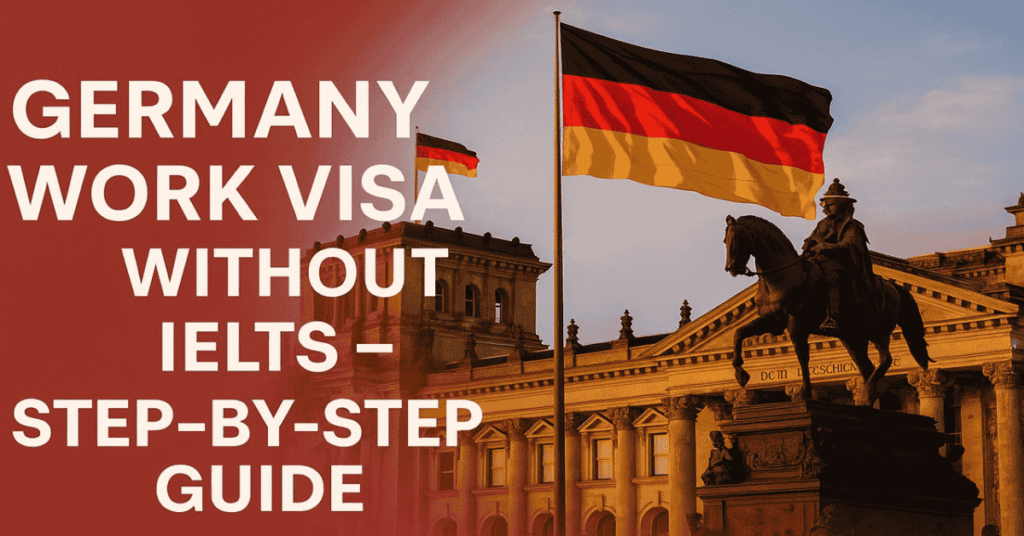Germany stands as one of Europe’s most dynamic and opportunity-rich destinations—especially for skilled professionals in engineering, healthcare, and manufacturing. If you’re planning a move in 2025, this guide breaks down everything you need to know: from eligibility requirements to step‑by‑step application procedures.
Who Needs a Germany Work Visa?
You’ll need a German work visa if you are:
-
Neither a citizen of the EU, EEA, or Switzerland,
-
Planning to work in Germany for more than 90 days,
-
Currently not holding any valid German or Schengen permit.
EU/EEA/Swiss nationals don’t need a visa; you can live and work freely in Germany, but must register upon arrival.
Eligibility Requirements (Without IELTS)
To qualify without IELTS, you must:
-
Have a confirmed job offer from a German employer.
-
Meet German salary standards—often matching collective agreements or minimum wage levels.
-
Hold a valid passport covering the entire employment duration.
-
Commit to working for the employer listed on your application—switching jobs requires a new permit.
-
Be offered a full-time position (part-time roles usually need special conditions).
-
Ensure the job was advertised in the EU/EEA for at least 10 days before the employer hired someone from outside.
Essential Documents Checklist
Prepare the following before applying:
-
Scanned passport (all identity pages)
-
Signed employment contract (role, salary, duration, hours)
-
Employer’s official job notification submitted to German authorities
-
Proof of insurance (health, life, social benefits)
-
Educational certificates or diplomas
-
Recommendation letters or proof of past work experience
-
Recent passport-sized photos meeting German standards
-
Optional cover letter, explaining your motivation and intentions
-
Proof of accommodation, if required
Application Process (No IELTS)
Step 1: Secure a Job Offer
Your employer must have advertised the role in the EU/EEA for at least 10 days before hiring you.
Step 2: Employer Submits Job Notification
They file a form with the German immigration authorities, including your employment details, salary, and insurance.
Step 3: Submit Your Visa Application
Once notified, apply online via the German immigration portal. Upload your documents and pay the visa fee.
Step 4: Pay the Fee
Pay the visa processing fee online. Amounts may vary depending on your profession and nationality.
Step 5: Wait for Processing
Processing usually takes 1–3 months, though additional requests can extend the timeline.
Step 6: Attend Embassy Appointment
If required, visit a German embassy or consulate for identity verification or biometric data.
Step 7: Receive Your Permit
Upon approval, you’ll receive your residence permit card, which allows legal work and residence in Germany.
Step 8: Travel & Begin Work
Once the permit arrives, travel to Germany and begin your employment as stated in your contract.
Also Read: Sweden Work Visa 2025 — Step-by-Step Guide, Requirements and Application Process
Visa Validity & Extensions
Your visa is typically valid for the duration of your contract (often 1–2 years).
Extensions are possible while in Germany.
After four years of continuous employment, you may qualify for permanent residency.
Family & Dependents
Your spouse and children (under 18) can join you. Requirements include:
-
Proof of relationship and financial support
-
Your employer or you providing insurance for dependents
Spouses often receive a work permit and may work as well.
Why Work in Germany?
-
High salaries and strong worker protections
-
Quality public healthcare
-
Excellent work-life balance
-
Access to free or low-cost German courses
-
Pathways to long-term residence and citizenship
Common Pitfalls to Avoid
-
Incomplete or poorly translated documents
-
Applying too close to your travel date
-
Overlooking job conditions (salary, hours, insurance)
-
Neglecting communication with your employer
-
Not keeping physical and digital copies of your application
Expert Tips
-
Apply early—start at least 3 months ahead of your planned move.
-
Choose employers with non-EU hiring experience to simplify your application.
-
Regularly check the German Federal Office for Migration and Refugees website for updates.
-
Keep your email notifications active and check every day—delays often stem from missed communications.
Also Read: Sweden Work Visa 2025 — Step-by-Step Guide, Requirements and Application Process
FAQs (Based on Real Queries)
1. Can I apply without taking IELTS?
Yes—Germany’s General Work Visa doesn’t mandate IELTS, though specific roles (e.g., in healthcare) may require German or English proficiency exams.
2. How soon do I get my residence permit?
Typically issued with your visa approval. You’ll get a physical card within a few weeks after arriving.
3. Can I switch employers on this visa?
No. You must apply for a new permit if you change employers.
4. How long does processing take?
Usually 1–3 months, but may take longer if more documentation is needed.
5. Will my spouse be allowed to work?
Yes. Spouses often receive work permits, allowing them to work full-time in Germany.
By following these structured steps and preparing thoroughly, your path to a Germany work visa in 2025 will be clear, confident, and on track. If you’ve secured a job and are ready to apply, you’re well on your way to a rewarding career in Germany.




